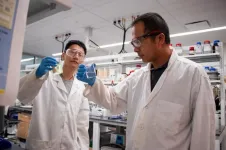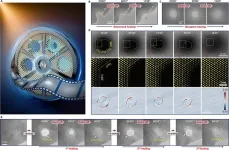(Press-News.org) WASHINGTON, D.C. - The use of Artificial Intelligence (AI) in scientific research is a top priority at the Department of Energy (DOE), which today announced $68 million in funding for 11 multi-institution projects, comprising 43 awards.
The funded projects will develop new ways to create foundation models, which are machine learning or deep learning models that can be used across a wide range of applications because they’re trained on broad data. Foundation models are a key building block of AI.
Those models will be used in computational science, to automate workflow in laboratories, to accelerate scientific programming, and much more. The possibilities are endless. Models will also be created using privacy-preserving and distributed methods and to develop energy-efficient AI algorithms and hardware for science.
These efforts expand upon work directed to DOE in Executive Order 14110 from the White House on the Safe, Secure, and Trustworthy Development and Use of Artificial Intelligence, including work to develop tools for the creation of foundation models for science and work to develop privacy-preserving AI technologies.
“Privacy preserving” is a priority because it protects personal data during machine-learning processes, allowing users to gain insights from data without jeopardizing sensitive information.
“Progress in AI is inspiring us to imagine faster and more-efficient ways to do science,” said Ceren Susut, DOE Associate Director of Science for Advanced Scientific Computing Research. “These research efforts will make scientific AI both more trustworthy and more energy efficient, unlocking AI’s potential to accelerate scientific discovery. There is a huge variety in the number of applications where scientists can use AI, from the laboratory to the field to producing scientific research.”
The projects in the funding cover a wide range of activities and diverse scientific applications. Included are studying how large foundation models for science improve as the models increase in size and complexity; training foundation models to preserve privacy and use data spread across multiple institutions; and developing energy-efficient algorithms using next-generation microtechnologies.
The projects were selected by competitive peer review under the DOE Funding Opportunity Announcement for Advancements in Artificial Intelligence for Science.
Total funding is $68 million for projects lasting up to three years, with $20 million in fiscal year 2024 dollars and outyear funding contingent on congressional appropriations. The list of projects and more information can be found on the Advanced Scientific Computing Research program homepage.
Selection for award negotiations is not a commitment by DOE to issue an award or provide funding. Before funding is issued, DOE and the applicants will undergo a negotiation process, and DOE may cancel negotiations and rescind the selection for any reason during that time.
END
Department of Energy announces $68 million in funding for artificial intelligence for scientific research
Projects span innovative AI foundation models, algorithms, and energy-efficient hardware
2024-09-06
ELSE PRESS RELEASES FROM THIS DATE:
DOE, ORNL announce opportunity to define future of high-performance computing
2024-09-06
The Department of Energy’s (DOE) Office of Science today announced a new research and development opportunity led by Oak Ridge National Laboratory (ORNL) to advance technologies and drive new capabilities for future supercomputers. This industry research program worth $23 million, called New Frontiers, will initiate partnerships with multiple companies to accelerate the R&D of critical technologies with renewed emphasis on energy efficiency for the next generation of post-exascale computing in the 2029 and beyond time frame.
“There is a growing consensus that urgent action is needed to address an array of bottlenecks ...
Molecular simulations, supercomputing lead to energy-saving biomaterials breakthrough
2024-09-06
A team led by scientists at the Department of Energy’s Oak Ridge National Laboratory identified and successfully demonstrated a new method to process a plant-based material called nanocellulose that reduced energy needs by a whopping 21%. The approach was discovered using molecular simulations run on the lab’s supercomputers, followed by pilot testing and analysis.
The method, leveraging a solvent of sodium hydroxide and urea in water, can significantly lower the production cost of nanocellulosic fiber — a strong, lightweight biomaterial ideal as a ...
Low-impact yoga and exercise found to help older women manage urinary incontinence
2024-09-06
Older women struggling with urinary incontinence can benefit from regular, low-impact exercise, with yoga as well as stretching and strengthening showing benefits in a new study published Aug. 27 in Annals of Internal Medicine.
The research, led by scientists at Stanford Medicine and the University of California, San Francisco, is part of a larger effort to identify low-risk, low-cost ways to treat one of the most common health problems women face as they age.
After 12 weeks of a low-impact yoga program, study participants had about 65% fewer episodes of incontinence. Women in a control group doing stretching and strengthening exercises ...
Genetic studies reveal new insights into cognitive impairment in schizophrenia
2024-09-06
In a comprehensive review of recent genetic and population studies, published in the peer-reviewed medical journal Genomic Psychiatry (Genomic Press, New York), Professors Michael Owen and Michael O'Donovan of Cardiff University's Centre for Neuropsychiatric Genetics and Genomics present evidence that challenges conventional wisdom about cognitive deficits in schizophrenia. Their analysis reveals that premorbid cognitive impairment – lower IQ and other cognitive deficits present before the onset of psychosis – is largely explained by non-familial factors rather than by the same inherited genetic variants that ...
Researcher develops technology to provide cleaner energy and cleaner water
2024-09-06
As the world transitions to cleaner energy sources, the need for energy-relevant metals and critical minerals has surged dramatically. Driven by the rise of electric vehicles and other green technologies, these essential materials are in high demand across the globe.
Metals, such as lithium, cannot be grown. They must be mined or recycled, making this a top priority for researchers in the mining industry. Traditional methods of mining lithium are expensive and can be harmful to the environment, but researchers at Virginia Tech have found a way to minimize this environment impact. They will optimize and scale up this method with ...
Expect the unexpected: nanoscale silver unveils intrinsic self-healing abilities
2024-09-06
As an innovative concept in materials science and engineering, the inspiration of self-healing materials comes from living organisms that have the innate ability to self-heal. Along with this line, the search for self-healing materials has been generally focused on “soft” materials like polymers and hydrogels. For solid-state metals instead, one may intuitively imagine that any form of self-healing will be much more difficult to achieve.
While a few past studies showcased the self-healing behavior in metals that more or less requires the assistance ...
nTIDE September 2024 Jobs Report: Gains in employment for people with disabilities appear to level off after reducing gaps with non-disabled workers
2024-09-06
East Hanover, NJ – September 6, 2024 – Employment and labor force participation trends for people with disabilities appear to be stabilizing after several years of growth that reduced the gaps between individuals with and without disabilities, according to today’s National Trends in Disability Employment – semi-monthly update (nTIDE) issued by Kessler Foundation and the University of New Hampshire’s Institute on Disability (UNH-IOD).
Over the past three months, both groups have seen declines in employment and labor force participation, reflecting a broader workforce ...
Wiley enhances NMR Spectral Library Collection with extensive new databases
2024-09-06
Wiley, one of the world’s largest publishers and a global leader in research and learning, today announced the addition of ten computed CNMR databases totaling over 384,000 records to its KnowItAll NMR Spectral Library collection. With this addition, the KnowItAll NMR collection now provides access to over 1.3 million spectra, making it one of the most comprehensive collections of NMR spectral data available.
“These new databases significantly enhance our ability to support researchers in their quest ...
Renowned psychiatrist Dr. Gustavo Turecki sheds light on depression, suicide, and brain trauma response
2024-09-06
Montreal, Canada - The "Innovators & Ideas: Research Leader" section of Genomic Psychiatry (ISSN: 2997-2388), published by Genomic Press, New York, features an illuminating Genomic Press Interview with Dr. Gustavo Turecki, a trailblazer in psychiatric research at McGill University. The interview delves into Turecki's pioneering work on depression, suicide prevention, and the molecular underpinnings of mental health, offering valuable insights into cutting-edge research shaping our understanding of these critical issues.
Dr. Turecki, who serves as the Chair of the Department of Psychiatry at McGill ...
Plasmonic modulators could enable high-capacity space communication
2024-09-06
Researchers have achieved data rates as high as 424Gbit/s across a 53-km turbulent free-space optical link using plasmonic modulators— devices that uses special light waves called surface plasmon polaritons to control and change optical signals. The new research lays the groundwork for high-speed optical communication links that transmit data over open air or space.
Free-space-optical communication networks could aid space exploration because they can provide high-speed, high-capacity data transmission with lower latency and less interference than traditional radio frequency communication systems. ...
LAST 30 PRESS RELEASES:
Scientists show how to predict world’s deadly scorpion hotspots
ASU researchers to lead AAAS panel on water insecurity in the United States
ASU professor Anne Stone to present at AAAS Conference in Phoenix on ancient origins of modern disease
Proposals for exploring viruses and skin as the next experimental quantum frontiers share US$30,000 science award
ASU researchers showcase scalable tech solutions for older adults living alone with cognitive decline at AAAS 2026
Scientists identify smooth regional trends in fruit fly survival strategies
Antipathy toward snakes? Your parents likely talked you into that at an early age
Sylvester Cancer Tip Sheet for Feb. 2026
Online exposure to medical misinformation concentrated among older adults
Telehealth improves access to genetic services for adult survivors of childhood cancers
Outdated mortality benchmarks risk missing early signs of famine and delay recognizing mass starvation
Newly discovered bacterium converts carbon dioxide into chemicals using electricity
Flipping and reversing mini-proteins could improve disease treatment
Scientists reveal major hidden source of atmospheric nitrogen pollution in fragile lake basin
Biochar emerges as a powerful tool for soil carbon neutrality and climate mitigation
Tiny cell messengers show big promise for safer protein and gene delivery
AMS releases statement regarding the decision to rescind EPA’s 2009 Endangerment Finding
Parents’ alcohol and drug use influences their children’s consumption, research shows
Modular assembly of chiral nitrogen-bridged rings achieved by palladium-catalyzed diastereoselective and enantioselective cascade cyclization reactions
Promoting civic engagement
AMS Science Preview: Hurricane slowdown, school snow days
Deforestation in the Amazon raises the surface temperature by 3 °C during the dry season
Model more accurately maps the impact of frost on corn crops
How did humans develop sharp vision? Lab-grown retinas show likely answer
Sour grapes? Taste, experience of sour foods depends on individual consumer
At AAAS, professor Krystal Tsosie argues the future of science must be Indigenous-led
From the lab to the living room: Decoding Parkinson’s patients movements in the real world
Research advances in porous materials, as highlighted in the 2025 Nobel Prize in Chemistry
Sally C. Morton, executive vice president of ASU Knowledge Enterprise, presents a bold and practical framework for moving research from discovery to real-world impact
Biochemical parameters in patients with diabetic nephropathy versus individuals with diabetes alone, non-diabetic nephropathy, and healthy controls
[Press-News.org] Department of Energy announces $68 million in funding for artificial intelligence for scientific researchProjects span innovative AI foundation models, algorithms, and energy-efficient hardware




